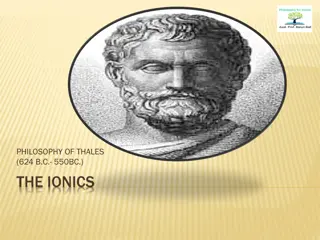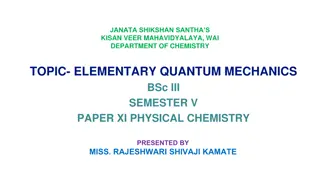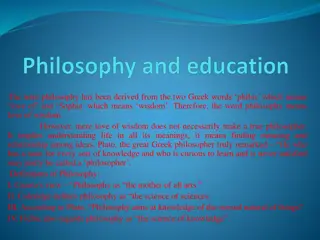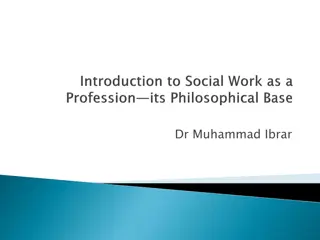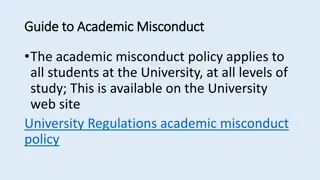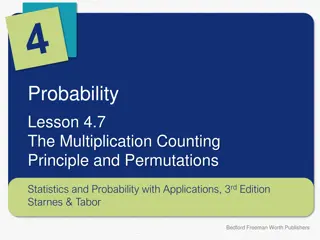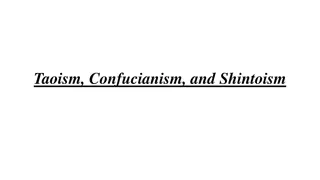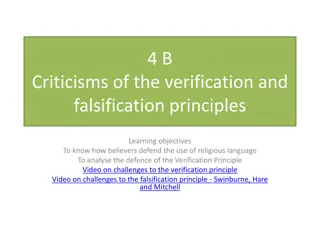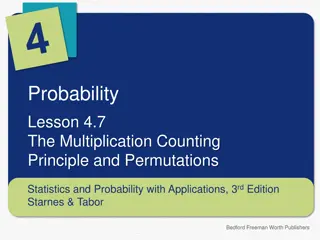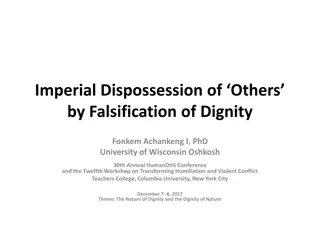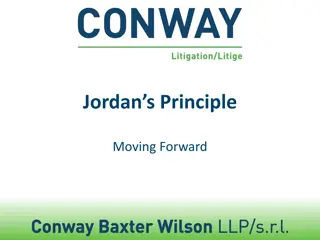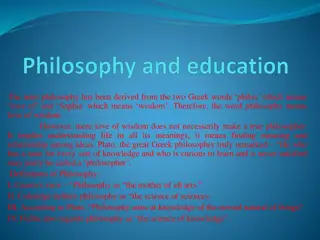Understanding the Falsification Principle in Philosophy
The Falsification Principle asserts that a statement is meaningful only if there's a way to prove it false. It's applied in science and challenges religious claims.
Download Presentation

Please find below an Image/Link to download the presentation.
The content on the website is provided AS IS for your information and personal use only. It may not be sold, licensed, or shared on other websites without obtaining consent from the author. Download presentation by click this link. If you encounter any issues during the download, it is possible that the publisher has removed the file from their server.
E N D
Presentation Transcript
Starter Summarise the Verification Principle in 20 words
The Falsification Principle Recap of the Falsification Principle using the A3/4 sheets Video summary of the falsification principle
1 The falsification principle - definition John Hick (1922-2012) In order to say something which may possibly be true, we must say something which may possibly be false. Faith and Knowledge. 1978. Write a definition Falsification: The philosophical theory that a statement is meaningless if there is no method in which it could be falsified. The falsification principle is not concerned with what may make something true, but with what may, in principle, make it false.
2 An exampleof Poppers was astronomy against astrology... The scientific status of a theory is its falsifiability, refutability, or testability Conjectures and Refutations: The Growth of Scientific Knowledge (1963) Albert Einstein's theory of gravity was a scientific theory as it was potentially falsifiable, meaning the truth or falseness of it could be tested against empirical observations of the universe. Karl Popper (1902- 1994) However, the claims of the mystic astrologers make their prophecies so vague that they are able to explain away anything that might refute their predictions had they been more precise In order to escape falsification they destroyed the testability of their theory. (Popper). Page 13 Astronomy Astrology Has meaning because . . . . Is ..
3 The falsification principle and religious language If this principle is applied to religious belief than falsification questions the nature of claims such as Jesus was the incarnation of God or God loves me . According to the falsification principle if these claims are factual they must be able to be tested against sense observations and therefore potentially be falsified.
4 God is good example List examples of evidence that might be used to argue against God s goodness List reasons that the believer might give to argue why a good God might have allowed these things in your list to happen Task: in groups of two continue this conversation... Person A; God loves all people . Person B; Then why does he allow them to suffer? ...
5 God the Father example see Hick (Blue booklet) page 102-103 Many people, who are not religious, often believe that there is no way to convince a religious individual that his or her religious beliefs are incorrect, that There wasn t a God after all or God does not really love us then Instead, when a religious individual sees a frantic father who is concerned about the health of his child, yet they cannot see an apparent concern coming from God, they are not swayed into believing that God does not really love us as a father loves his child , rather that God s love is slightly different then what was originally asserted. What then, Flew asks the religious, would have to occur or to have occurred to constitute for you a disproof of the love of, or the existence of, God? Is there anyway to show you that your assertion is incorrect, and that the opposite is true? Flew believes that there is not, and therefore, that their assertions can never be disproven, and are therefore, merely utterances. But what is an assertion? Flew next gives the basic idea of what an assertion is. An assertion typically asserts that such and such is the case . Anything that negates this assertion, that proves that such and such is not the case, would be proof against the assertion.
Recap - discussion God is loving - Challenges 1. 2. 3. Religious response What is the problem with religious language?
6 Anthony Flew (1923-2010) Flew stated that it often seems to the non-religious there is no event or series of events that would ever convince the sophisticated religious person that There wasn t a God after all . (Flew, Theology & Falsification: A Symposium, 1955) Once upon a time two explorers came upon a clearing in the jungle. In the clearing were growing many flowers and many weeds. One explorer says, Some gardener must tend this plot . The other disagrees, There is no gardener . So they pitch their tents and set a watch. No gardener is ever seen. But perhaps he is an invisible gardener. So they set up a barbed-wire fence. They electrify it. They patrol with bloodhounds (For they remember how H.G. Wells s The Invisible Man could be both smelt and touched though he could not be seen). But no shrieks ever suggest that some intruder has received a shock. No movements of the wire ever betray an invisible climber. The bloodhounds never give cry. Yet still the Believer is not convinced. But there is a gardener, invisible, intangible, insensible to electric shocks, a gardener who has no scent and makes no sound, a gardener who comes secretly to look after the garden which he loves. At last the Sceptic despairs, But what remains of our original assertion? Just how does what you call an invisible, intangible, eternally elusive gardener differ from an imaginary gardener or even from no gardener at all?
Activity Either 1. In pairs write a script summary of the parable of the gardener read to class Or 1. In pairs create a cartoon strip of the parable of the gardener Do you agree with Flew that there is no difference between an imaginary gardener and no gardener? One of the pair argue for and the other against. Write your key ideas as a table or two spider diagrams.
Flews argument is that religious believers act in the same way as the believing explorer. Flew gives the example of saying God loves people, even if disaster happens. His argument is that people still go on believing in the loving God. No experience seems to falsify a religious believer s faith. Flew therefore argues that God-talk is meaningless as it is unfalsifiable, in the same way as the eternally elusive gardener in his analogy. Flew suggested that God died a death by a thousand qualifications . By this phrase, Flew meant that when a religious believer is challenged about the existence of God, or God s nature, their response is to modify the way they talk about God to respond to the challenge, that is, they try to qualify (explain/justify) what it is they have said by changing, altering or explaining what they have said by using an equally vague and unfalsifiable statement). Flew argues that believers end up modifying their statements about God so much when challenged, that the statements no longer resemble the original claim about God in other words, their belief in God dies a death by a thousand qualifications .
Task: Look at the first statement then consider how the second challenges it. (a) God is all-powerful (a) God did not prevent hurricane Katrina (b) God answers the prayers of his faithful (b) People pray for healing and it does not happen (c) God loves us (c) Many evil people have good lives, whilst good people suffer Q. Can the religious believer challenge Flew without proving him right?
Author Story Outline of the Story Implication Possible Response If Flew s _______ is an accurate description of religious ______ this is a serious challenge to a believer s faith claims as it suggests that: 1. Faith claims are an incorrect and irrational interpretation of the world that goes against the __________ 2. Religious believers ______ to accept that their beliefs are irrational as they keep qualifying them Religious potentially believers do no continually qualify their beliefs, instead religious believers clarify and state their beliefs more clearly e.g. the _______ defence is an explanation of belief in God and Freewill, it cannot be dismissed as a qualification belief falsifiable. statements are Religious One of the_____ repeatedly modifies the qualities he attributes too an alleged _______ who looks after the forest clearing. ______ used the parable to suggest that religious believers refuse to let their beliefs be _______, instead, when challenged, religious believers qualify their belief, altering it to avoid the_______. Flew argues that eventually the original belief is lost, dying a death of a________________ Anthony Flew taken from John Wisdom Parable of the Two Explorers in the Jungle Peter Donovan noted that: The sense of knowing is never on its own a sufficient sign of knowledge But if the sense of God fails, in the end, to count as knowledge of God, what is to be said about it? Is it of no further philosophical interest discarded, like a pricked balloon, as being simply a great illusion? Nothing that has been said here leads to that conclusion. There is no justification for taking such an all-or-nothing view of religious experience Religious Experience, 1979) and to be (Interpreting
Author Story Outline of the Story Implication Possible Response If Flew s analogy is an accurate description of religious belief this is a serious challenge to a believer s faith claims as it suggests that: 1. Faith claims are an incorrect and irrational interpretation of the world that goes against the evidence 2. Religious believers refuse to accept that their beliefs are irrational as they keep qualifying them Religious potentially believers do no continually qualify their beliefs, instead religious believers clarify and state their beliefs more clearly e.g. the freewill defence is an explanation of belief in God and Freewill, it cannot be dismissed as a qualification belief falsifiable. statements are One of the explorers repeatedly modifies the qualities he attributes too an alleged gardener who looks after the forest clearing. Flew used the parable to suggest that religious believers refuse to let their beliefs be falsified, instead, when challenged, religious believers qualify their belief, altering it to avoid the criticism. Flew argues that eventually the original belief is lost, dying a death of a thousand qualifications Religious Parable of the Two Explorer s in the Jungle Peter Donovan noted that: The sense of knowing is never on its own a sufficient sign of knowledge But if the sense of God fails, in the end, to count as knowledge of God, what is to be said about it? Is it of no further philosophical interest discarded, like a pricked balloon, as being simply a great illusion? Nothing that has been said here leads to that conclusion. There is no justification for taking such an all-or-nothing view of religious experience Religious Experience, 1979) Anthony Flew and to be (Interpreting
Theology and Falsification :Symposium In 1955 the falsification theory was discussed by Antony Flew, R.M. Hare and Basil Mitchell in an article titled Theology and Falsification: Symposium in the Journal New Essays in Philosophical Theology. Flew s position: Theological utterances are not assertions; they have no cognitive meaning Hare s position: Flew is right to say theological utterances are not assertions, however, they are bliks and so are meaningful Mitchell s position: Theological utterances are meant as assertions and they are very meaningful to those who hold onto them.


